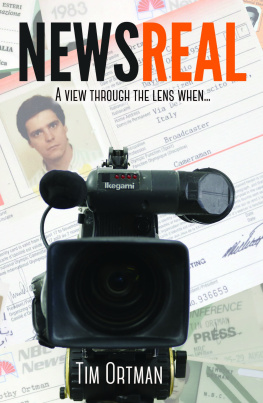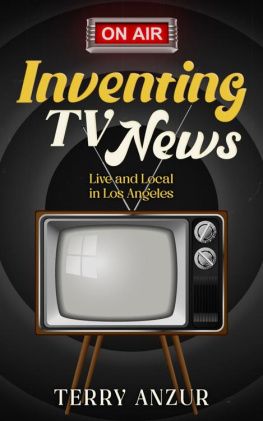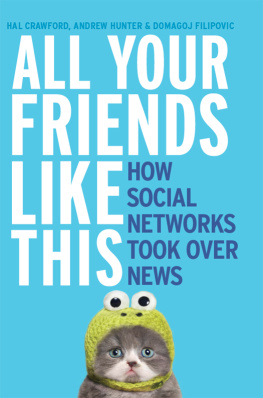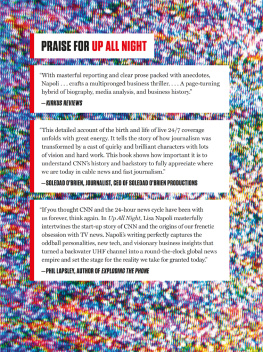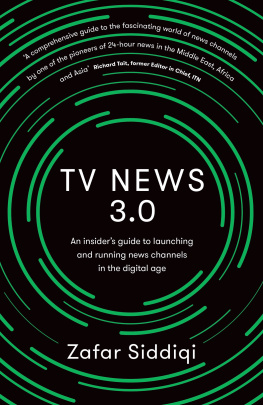NEWSREAL
A view through the lens, when
Tim Ortman
This book is a work of non-fiction. Due to the sensitive nature of the material herein, the names of certain persons, personages, and
locations may have been changed to protect subjects confidentiality.
Also, certain incidents have been reconstructed and dialogue reassembled, based on the Authors journals written during the period this book covers, and on his memory of events. Every effort has been made to be accurate and inclusive of facts. There may be instances where names have been omitted from events without intention.
Copyright 2018 by Tim Ortman
All rights reserved. No part of this book may be used or reproduced in any manner whatsoever without the prior written permission
of the publisher, except in the case of brief quotations embodied in critical articles and reviews.
For more information, to inquire about rights to this or other works, or to purchase copies for special educational, business, or sales promotional uses, please write to:

Incorgnito Publishing Press
A division of Market Management Group, LLC 300 East Bellevue Drive
Suite 208
Pasadena, CA 91101
888-859-0792
FIRST EDITION
Printed in the United States of America ISBN: 978-1-944589-68-4
10 9 8 7 6 5 4 3 2 1
DEDICATION
For Julia, Alexa, Alec & Aubrey for all their love and support.
And, for my parents Bud & Audrey, from whom I received the storytelling gene and so much more.
PREPARING FOR TAKE-OFF
It was late Fall in 1982. I was a twenty-five-year-old cameraman who had recently moved from a small TV station in Dayton, OH, the 102 nd largest TV market in America, to Chicago, which was the second largest market in America and behind only New York City. My annual salary had increased eight-fold and I felt like I had arrived; Id arrived at the city of broad shoulders, and I was going to savor every moment like it was an endless deep-dish pizza.
I was in the bowels of Chicagos massive Merchandise Mart, the largest commercial building in the world (at the time) whose largest tenant was NBCs WMAQ-TV, my employer. It was the end of my shift and I was snaking my way through the loading dock maze where the logo- emblazoned sat (satellite) trucks, microwave vans, and crew cars were parked. This area was also home to the crew lounge where the saltier side of the news labor pool resided. It was from here where, each day, the news crews would pack up, launch, and return. There were also camera people on the 12 th floor who resided in temperature-controlled studios and worked in perfectly controlled lighting conditions to shoot perfectly made up news anchors in order to deliver a perfectly scripted newscast each and every night. I was just cut from different cloth.
The news crew was the flip-side of that coin. These were teams of (almost solely) men who lived not in the studio, but in the field or on location where I felt most at home, and where wed gather the pictures and sounds of news on a daily basis, pulling together the exact elements that eventually tell the story of todays news. It takes a special, slightly twisted breed to hit the streets with the mostly unwashed masses. But more on that after the break.
Each day, my co-workers and I would load our camera gear into crew cars and vans, and head out into the streets of Chicago to gather the local news. It could be for an interview with the Mayor at City Hall, or a gang shooting in the housing projects, or another familiar loss by the Cubs. It didnt matter. For me, the stories and trips out were all a thrill. I had to pinch myself. Just by clocking in for work, I was walking on air.
The gigantic leap from Dayton to Chicago had been precipitated a few years prior to this, during my formative years in college specifically at WBGU-TV, channel 57 on the dial and located on the Bowling Green State University campus. Like so many other students, then and now, I worked throughout college to put a little beer and pot money aside for the weekends (actually, looking back on it, I have to say college was one 4-year-long weekend). However, instead of working at the cafeteria or the library for my $2.40/hr. minimum wage, I chose a TV station. I was majoring in Television and Film Production, and so working at a place with satellite dishes on the outside and cameras on the inside just made sense to me. Channel 57 was not the tiny college radio station romanticized by countless broadcasters reflecting upon their halcyon days. This was a fully functioning PBS broadcast facility filled with sophisticated equipment. The Corporation for Public Broadcasting had been decimated and nearly shut down by the Nixon Administration in the early 70s, but this was 1976. Jimmy Carter was proudly rebuilding it and shoveling money into every aspect of PBS. Our little station was a beneficiary of that attention. For the next three years, I would work, almost unknowingly, with what was the latest, greatest equipment and advanced technology of the day in the television biz. As a college student! And I wasnt alone. It was like a laboratory of creativity. The entire place was staffed by eager students like me. Of course, the station also had a buttoned-up general manager, a couple of producer/ directors, and a few engineers the requisite handful of grown-ups to make sure that the student employees didnt burn the place down and who also gave it an air of PBS respectability, but the inmates were truly running the asylum. The fact that our entire viewing audience consisted of a few university professors and about 150 Northwest Ohio farmers didnt really matter to anyone.
You could do as much or as little as you wanted. Flourish or languish; it was up to you. My first job was as a weekend videotape operator. Mildly hungover, I would leap out of my dorm bed at 5:45 a.m. for the 10-minute sprint to the station, arriving in the nick of time to assist with the 6
a.m. sign-on. My critical role in this process was to load enormous videotape reels of programs like SesameStreet and Mister Rodgers Neighborhood onto large, clunky videotape recorders (VTRs). To say a trained monkey could perform this task would malign the trained monkeys of the world.
After Id had more than a few months on the job, Joe Rooks, a colleague with whom Id chatted on a couple of occasions, entered my VTR hideaway for what I thought was an unscheduled shoot-the-shit session. Like me, he was a student employee. Unlike me, he was approaching thirty, had served a couple of tours in Vietnam, had a wife and young daughter, and was one of the more senior guys at the station with years of production experience. His scruffy orange beard blended seamlessly with his omnipresent grin, which in turn transformed his already narrow eyes into permanent slits. Except at this moment, he wasnt grinning.
What are you doing? he began abruptly. His opening inquiry masked his true intention. This was not about what I was doing, but rather what I wasnt.
Sheepishly, I replied, WellIm, uh, loading shows onto the VTR. You see, I take this tape and I thread it through these wheel things here, and then I press the remote button, and then the signal goes upstairs to an engineer, and then he
I know what the fuck youre doing. But what the fuck are you DOING, here. Now? Dont you get it? I mean, how long you been here? Look around. Theres all kinds of cool shit here to learn and perfect. This place can be like your own private playground, but youre stuck in here on the Merry-Go-Round. All you have to do is ask, and you can get trained on anything and everything in the station. But you have to ask. You gotta wanna do it.
Next page
